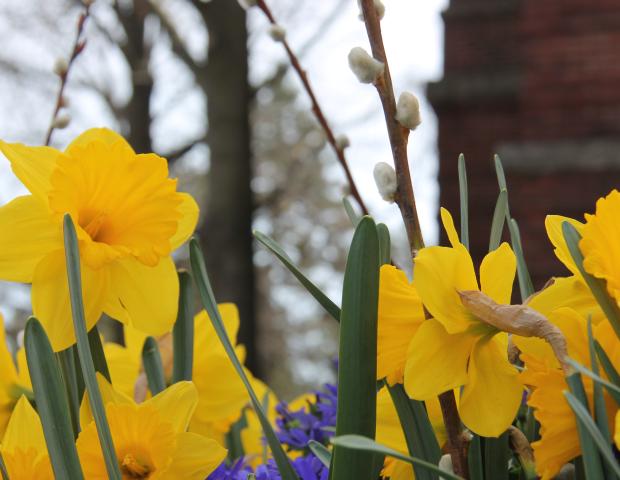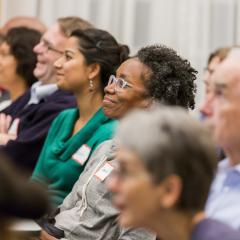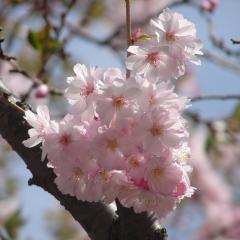What Is Learning?
To help commemorate our 30th anniversary year of 2023, we asked some scholar friends of ours to share personal reflections on the meaning of peace, learning, and dialogue. Here are four thought-provoking answers to the question: What is learning?
From Larry Hickman, Professor of Philosophy Emeritus and Former Director of the Center for Dewey Studies at Southern Illinois University
During more than 15 years of association with the Ikeda Center and Soka University of America, I have come to believe that if Soka education and Dewey-inspired education are not twins, they are at least affectionate siblings, particularly in terms of their shared understanding of learning in its honorific sense.
Learning is first of all critical: it is neither uncritical acceptance of received cultural values nor uncritical rejection of them. Learning is progressive – one might even say exponential: it creates the means/meanings that free up new means/meanings that energize experience to develop exponentially in terms of its own developing ends-in-view. Learning is unpredictable: even failure can stimulate new sources and avenues of learning. Learning nourishes doubt. Doubt is an essential component of learning as the ongoing reconstruction of experience. Learning is social and it is collaborative: it lies in the lap of an enormous biological/cultural heritage which can be further developed by shared interest and effort. Learning is embodied, extended, and emotional: it is not just in the head, as some philosophers have argued, nor is primarily linguistic, as others have proposed. Learning involves an organism both accommodating itself to its environment, including its social environment, and also altering that environment to its needs and further development.
For Soka education, as I have come to understand it, learning is about learning to learn to create value. For Dewey-inspired education, learning is about the growth of individuals and communities. In both traditions, learning is an essential component of faith in democracy as faith in the ability of experience to grow in ordered richness.
Learning combines serious habits of mind with a sense of pleasure.
Peter Stearns
From Peter Stearns, University Professor and Provost Emeritus, George Mason University
One of the real pleasures in teaching undergraduates, particularly first year students, is the opportunity to work with them (implicitly) on what learning is all about. This can also be one of the real frustrations, but let me also note that many young students have a pretty good idea about learning even as they enter college.
The first hurdle is pretty straightforward, at least in my field of history: helping students move beyond a sense that learning consists primarily of memorization or, for an essay, relying on their unquestionable ability to tap resources on the Internet. Facts count, though so in some instances do disputes about facts. But learning centers on the ability to use data to address larger questions, about the causes or impact of major developments.
Learning also involves experience in evaluating points of view that differ from one’s own, including those that reflect a different cultural framework. The same impulse that pushes for an emphasis on memorization can also seek a single interpretation – “The Truth” – rather than the complexity that actually reflects the world around us.
Learning in this sense also moves toward empathy, a capacity to recognize the humanity of people caught up in situations very different from our own. Learning, in other words, gives us habits of mind, as well as specific information, essential for developing responsible citizenship in a now-global world.
Finally, and I hope at least some of my students grasp this as well: learning combines serious habits of mind with a sense of pleasure. There is, as we all come to know, no limit on learning, and the capacity to maintain the appetite should be one of the results of any program of education at any level. I want my students to want to learn more; I know I do.
From Bill Schubert, Professor Emeritus of Curriculum & Instruction, University of Illinois at Chicago
I see learning, dialogue, and peace as building cumulatively on each other, any one of them needing the other two for a movement toward a continuously growing Wholeness, especially when perceived through the perspectives of Daisaku Ikeda and his mentors, Josei Toda and Tsunesaburo Makiguchi. It is my hope that educators should strive to inspire students by making explicit that they encourage these pursuits in all of their experiences, not only in school.
Learning is the continuous reformation of knowledge, skills, dispositions, appreciations, and the creation of values that shape perspectives on the world, give meaning to experience, develop action in the world, evaluate its consequences, revise, and act again throughout life. I like to call this process the perpetual development of the theory within. In speculating on the theory within I have been influenced by variations on this notion of learning by many scholars: Johann Friedrich Herbart’s the apperceptive mass, drawing upon Rene Descartes, Immanuel Kant, Gottfried Leibniz, Wilhelm Wundt; philosopher John Dewey’s continuous reconstruction of experience; Alfred Adler’s prism of personal interests; Pierre Teilhard de Chardin’s noosphere; psychologist George Kelly’s personal constructs; economist Kenneth Boulding’s evolving image; and George Lakoff and Mark Johnson’s philosophy in the flesh – among many others – while Makiguchi, Toda, and Ikeda might see learning as the ongoing results of value creation.
From Donna Hicks, Associate at the Weatherhead Center for International Affairs, Harvard University, and Author, Dignity: It’s Essential Role in Resolving Conflict
Learning is recognizing that the relationship between who we are and what we are capable of becoming is infinite.



